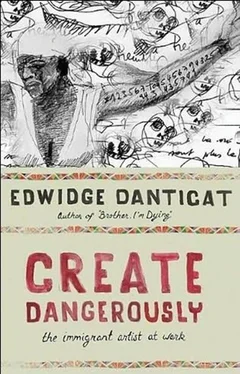How does that reader find the courage to take this bite, open that book? After an arrest, an execution? Of course he or she may find it in the power of the hushed chorus of other readers, but she can also find it in the writer’s courage in having stepped forward, in having written, or rewritten, in the first place.
Create dangerously, for people who read dangerously. This is what I’ve always thought it meant to be a writer. Writing, knowing in part that no matter how trivial your words may seem, someday, somewhere, someone may risk his or her life to read them. Coming from where I come from, with the history I have-having spent the first twelve years of my life under both dictatorships of Papa Doc and his son, Jean-Claude-this is what I’ve always seen as the unifying principle among all writers. This is what, among other things, might join Albert Camus and Sophocles to Toni Morrison, Alice Walker, Osip Mandelstam, and Ralph Waldo Emerson to Ralph Waldo Ellison. Somewhere, if not now, then maybe years in the future, a future that we may have yet to dream of, someone may risk his or her life to read us. Somewhere, if not now, then maybe years in the future, we may also save someone’s life, because they have given us a passport, making us honorary citizens of their culture.
This is why when I wrote a book called The Dew Breaker , a book about a choukèt lawoze , or a Duvalier-era torturer, a book that is partly set in the period following the Numa and Drouin executions, I used an epigraph from a poem by Osip Mandelstam, who famously said, “Only in Russia is poetry respected-it gets people killed.”
The quotation I used is:
Maybe this is the beginning of madness…
Forgive me for what I am saying.
Read it… quietly, quietly.
There are many possible interpretations of what it means to create dangerously, and Albert Camus, like the poet Osip Mandelstam, suggests that it is creating as a revolt against silence, creating when both the creation and the reception, the writing and the reading, are dangerous undertakings, disobedience to a directive.
This is a part of my story that I have always wanted to understand better: my family’s brief encounters with the pleasures and dangers of reading. I am at a great deficit here because, aside from my much older cousin Maxo, there were not many fanatical readers in my family that I know of, much less people who would risk their lives over a book. Perhaps at a time when one could be shot so easily, assassinated so publicly, not reading or writing was a survival mechanism. Still, sprinkles of other readers’ stories continue to intrigue and thrill me. Young men and women who worshipped Euripides and Voltaire, George Sand and Colette and Haiti’s own physician novelist, Jacques Stephen Alexis, who in April 1961, three years before Numa and Drouin were executed, had been ambushed and murdered trying to return from exile, some say, to help topple the Duvalier dictatorship.
No one in my family that I know of had witnessed Numa and Drouin’s execution in person. Still they could not help, when it came up, talking about it, even if in the broadest of terms.
“It was a very tragic time,” my mother now says.
“It was something that touched a generation,” my minister uncle used to say.
They were patriots who died so the rest of us could live, is a line I borrowed from my father. My father was the one who, while lying on his deathbed in early 2005, first told me about the banned books and the plays. Only when he mentioned togas and Caesars, and an author with a name that sounds like camion , did I manage to find my way, among many other possible choices, to Camus’ Caligula . I could be wrong about this too, making connections only I believe are there.
The only book my parents and uncle have read more than once is the Bible. I used to fear their reading my books, worried about disappointing them. My stories do not hold a candle to having lived under a dictatorship for most of your adult life, to having your neighbors disappear and not being able even to acknowledge it, to being forced to act as though these neighbors had never existed at all. Reading, and perhaps ultimately writing, is nothing like living in a place and time where two very young men are killed in a way that is treated like entertainment.
Mourir est beau , to die is beautiful, declares the Haitian national anthem. But writing could never attain that kind of beauty. Or could it? Writing is nothing like dying in, for, and possibly with, your country.
When I first started returning as a public person, as an “author,” to Haiti, a place where people trace your failures and successes along family lines, I was often asked if there were any writers in my family. If there were, I do not know. But another thing that has always haunted and obsessed me is trying to write the things that have always haunted and obsessed those who came before me.
Bel Air, now a destitute and earthquake-ravaged slum overlooking Port-au-Prince harbor, was still a poor neighborhood when I was growing up there. But, along with ideological students, our neighborhood also had its intellectuals. The brilliant and compassionate Haitian novelist/poet/playwright/painter Franketienne grew up in Bel Air, as did the younger novelist and poet Louis Phillipe Dalembert, who later left for Paris and then Rome. There was also Edner Day, a well-known Macoute, who tried to court one of my young cousins, who tried to court everyone’s young cousins. He seemed literary for no other reason than that he was sometimes seen in the afternoons sitting on his balcony reading. But he was also a rumored murderer, one of those who may have shot Numa and Drouin.
In “Create Dangerously,” Camus writes: “Art cannot be a monologue. We are on the high seas. The artist, like everyone else, must bend to his oar, without dying if possible.” In many ways, Numa and Drouin shared the destiny of many Haitian artists, particularly that of the physician-novelist Jacques Stephen Alexis, who wrote such beautiful prose that the first time I read his description of freshly baked bread, I raised the book closer to my nose to sniff it. Perhaps there are no writers in my family because they were too busy trying to find bread. Perhaps there are no writers in my family because they were not allowed to or could barely afford to attend a decrepit village school as children. Perhaps there are no artists in my family because they were silenced by the brutal directives of one dictatorship, or one natural disaster, after another. Perhaps, just as Alice Walker writes of her own forebears in her essay “In Search of Our Mother’s Gardens,” my blood ancestors-unlike my literary ancestors-were so weather-beaten, terror-stricken, and maimed that they were stifled. As a result, those who somehow managed to create became, in my view, martyrs and saints.
“Instead of being perceived as whole persons,” wrote Walker, “their bodies became shrines: what was thought to be their minds became temples suitable for worship. These crazy ‘Saints’ stared out at the world, wildly, like lunatics-or quietly, like suicides; and the ‘God’ that was in their gaze was as mute as a great stone.”
Of course I could be completely off base. Bel Air’s Frankétienne, among others, somehow managed to remain human and alive in Haiti, before, during, and after the Duvalier dictatorship, producing a massive and innovative body of work. Balancing on the metaphorical high seas and bending to their oars without dying is what the majority of Haitians have always done, generation after generation. This legacy of resilience and survival is what had inspired Jacques Stephen Alexis, Marcel Numa and Louis Drouin, and so many others to sacrifice their lives. Their death is possibly among the shocking incidents that eventually motivated so many others, like my parents, for example, to leave. This may be one of the reasons I live in the United States of America today, writing in this language that is not mine. This could possibly be why I am an immigrant and hopefully an artist, an immigrant artist at work. Even though there is probably no such thing as an immigrant artist in this globalized age, when Algeria and Haiti and even ancient Greece and Egypt are only a virtual visit away. Even without globalization, the writer bound to the reader, under diabolic, or even joyful, circumstances inevitably becomes a loyal citizen of the country of his readers.
Читать дальше












